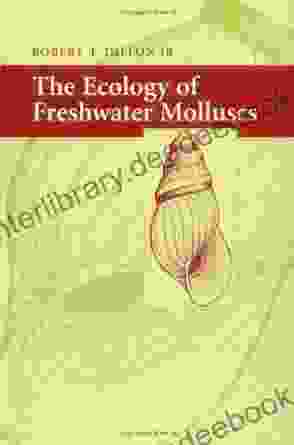The Ecology of Freshwater Molluscs

Freshwater molluscs, or freshwater snails and clams, are a diverse and ecologically important group of invertebrates that inhabit a wide range of aquatic habitats, including rivers, lakes, ponds, and wetlands. These organisms play crucial roles in ecosystem functioning, serving as primary consumers, nutrient cyclers, and habitat providers.
4.3 out of 5
| Language | : | English |
| File size | : | 7029 KB |
| Text-to-Speech | : | Enabled |
| Screen Reader | : | Supported |
| Print length | : | 524 pages |
| Lending | : | Enabled |
Diversity and Distribution
Freshwater molluscs exhibit a wide range of diversity, with over 20,000 known species worldwide. They belong to three main classes: gastropods (snails),bivalves (clams and mussels),and scaphopods (tusk shells). Gastropods are the most common and diverse group, comprising over 80% of freshwater mollusc species.
Freshwater molluscs can be found in various habitats, but they are particularly abundant in riverine and lacustrine systems. They occupy a wide range of ecological niches, from shallow, fast-flowing streams to deep, slow-flowing lakes.
Habitat Preferences
The habitat preferences of freshwater molluscs are influenced by several environmental factors, including water quality, substrate type, and vegetation cover. Different species exhibit varying degrees of specialization, with some being highly adapted to specific habitats while others are more generalist.
Water quality is a crucial factor for freshwater molluscs, as they are sensitive to pollutants and changes in pH and dissolved oxygen levels. They prefer clean, well-oxygenated water with low levels of turbidity and contaminants.
Substrate type also plays a significant role in habitat selection. Many freshwater molluscs prefer hard substrates, such as rocks, gravel, and wood, to which they can attach themselves. Others are adapted to soft substrates, such as sand and mud, where they burrow for protection.
Vegetation cover is another important habitat factor for freshwater molluscs. Aquatic plants provide shelter, food, and egg-laying sites. Some species have specialized adaptations for living in close association with specific plant species.
Feeding Habits
Freshwater molluscs have diverse feeding habits, reflecting their adaptation to various habitats and food sources. Gastropods are primarily herbivores, grazers, or deposit-feeders, consuming algae, biofilm, and detritus. Some species are carnivorous, feeding on small invertebrates or even other molluscs.
Bivalves are filter-feeders, using their specialized gills to trap and ingest suspended particles from the water. They play an important role in removing organic matter and phytoplankton from the water column.
Ecological Importance
Freshwater molluscs are ecologically important organisms that perform several vital functions within aquatic ecosystems.
1. Primary Consumers:
Freshwater molluscs are primary consumers, feeding on algae, biofilm, and other organic matter. This feeding activity helps to control the growth of algae, preventing blooms and maintaining water quality.
2. Nutrient Cyclers:
As filter-feeders, bivalves play a crucial role in nutrient cycling. They remove organic matter from the water column, processing it and releasing nutrients back into the ecosystem through their waste products.
3. Habitat Providers:
The shells of freshwater molluscs provide important habitat for other aquatic organisms, including insects, crustaceans, and fish. These shells offer shelter from predators, currents, and desiccation.
Conservation
Freshwater molluscs are facing numerous threats, including habitat loss, pollution, and climate change. The destruction and degradation of aquatic habitats, particularly due to urbanization and agriculture, have resulted in population declines for many species.
Pollution from industrial effluents, agricultural runoff, and sewage can have detrimental effects on freshwater molluscs. Heavy metals, pesticides, and other toxic substances can accumulate in their tissues, leading to reduced growth, reproduction, and survival.
Climate change poses additional challenges for freshwater molluscs. Rising water temperatures and changes in precipitation patterns can alter their distribution and abundance. Extreme events, such as floods and droughts, can further stress these organisms.
Conservation efforts are essential to protect freshwater molluscs and their vital ecological roles. These efforts should focus on maintaining and restoring aquatic habitats, controlling pollution sources, and mitigating the impacts of climate change.
Freshwater molluscs are ecologically important organisms that play a significant role in the functioning of aquatic ecosystems. Understanding their diversity, habitats, feeding habits, and ecological significance is crucial for their conservation and the preservation of healthy aquatic environments.
4.3 out of 5
| Language | : | English |
| File size | : | 7029 KB |
| Text-to-Speech | : | Enabled |
| Screen Reader | : | Supported |
| Print length | : | 524 pages |
| Lending | : | Enabled |
Do you want to contribute by writing guest posts on this blog?
Please contact us and send us a resume of previous articles that you have written.
 Book
Book Novel
Novel Page
Page Text
Text Genre
Genre Reader
Reader Library
Library Paperback
Paperback Magazine
Magazine Newspaper
Newspaper Sentence
Sentence Bookmark
Bookmark Shelf
Shelf Glossary
Glossary Bibliography
Bibliography Foreword
Foreword Preface
Preface Annotation
Annotation Manuscript
Manuscript Scroll
Scroll Codex
Codex Tome
Tome Narrative
Narrative Biography
Biography Dictionary
Dictionary Character
Character Resolution
Resolution Periodicals
Periodicals Study
Study Research
Research Lending
Lending Academic
Academic Rare Books
Rare Books Interlibrary
Interlibrary Literacy
Literacy Study Group
Study Group Thesis
Thesis Dissertation
Dissertation Reading List
Reading List Theory
Theory Marlene Orozco
Marlene Orozco A R Ivanovich
A R Ivanovich Carla Cunha
Carla Cunha Emm Gryner
Emm Gryner Kate Meader
Kate Meader Rosie Clarke
Rosie Clarke Stacy Horn
Stacy Horn Kenny Kings
Kenny Kings Hiromi Uehara
Hiromi Uehara Aliza Mann
Aliza Mann Paul Brown
Paul Brown Mark C Scott
Mark C Scott James W Stanfield Jr
James W Stanfield Jr Candi B
Candi B Rita Mulcahy
Rita Mulcahy Geoffrey Mcskimming
Geoffrey Mcskimming Francesca Polletta
Francesca Polletta Clarence Hawkes
Clarence Hawkes James Griffiths
James Griffiths Tony Bradman
Tony Bradman
Light bulbAdvertise smarter! Our strategic ad space ensures maximum exposure. Reserve your spot today!

 Gene PowellBurnt Out in Bogotá: Dan Wallace's Journey Through Addiction, Redemption, and...
Gene PowellBurnt Out in Bogotá: Dan Wallace's Journey Through Addiction, Redemption, and... Mark TwainFollow ·10.8k
Mark TwainFollow ·10.8k Thomas PowellFollow ·19k
Thomas PowellFollow ·19k Darius CoxFollow ·4.9k
Darius CoxFollow ·4.9k Noah BlairFollow ·19.4k
Noah BlairFollow ·19.4k Jamie BlairFollow ·9.1k
Jamie BlairFollow ·9.1k Ralph TurnerFollow ·13.5k
Ralph TurnerFollow ·13.5k Vladimir NabokovFollow ·16.6k
Vladimir NabokovFollow ·16.6k Edward BellFollow ·4k
Edward BellFollow ·4k

 Bo Cox
Bo CoxDiscover the Enchanting Allure of Collingwood, Ontario,...
Nestled amidst the breathtaking landscape of...

 Ralph Ellison
Ralph EllisonThe Street of Clocks Poems: A Poetic Journey Through Time
Welcome to The Street...

 Dwight Blair
Dwight BlairCritical Political Economy of the Middle East and North...
The Middle East and...

 Deion Simmons
Deion SimmonsPerfect Strategies For Painting Amazing Marine Creatures...
Gouache is a...

 Hugh Bell
Hugh BellThe American Republic: Constitution, Tendencies, and...
The American Republic,...
4.3 out of 5
| Language | : | English |
| File size | : | 7029 KB |
| Text-to-Speech | : | Enabled |
| Screen Reader | : | Supported |
| Print length | : | 524 pages |
| Lending | : | Enabled |












